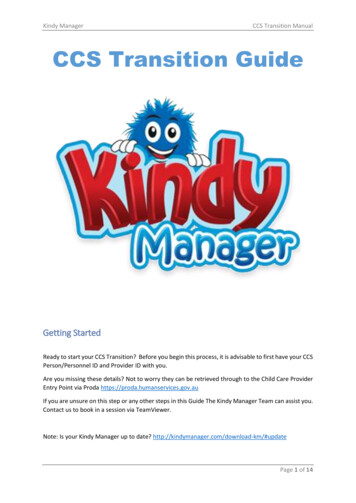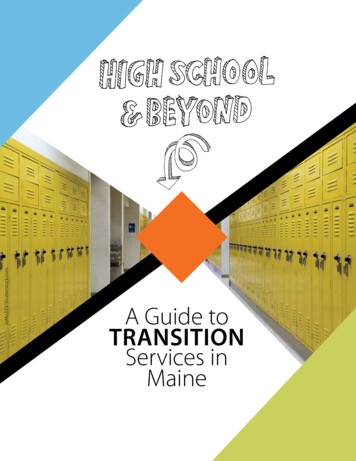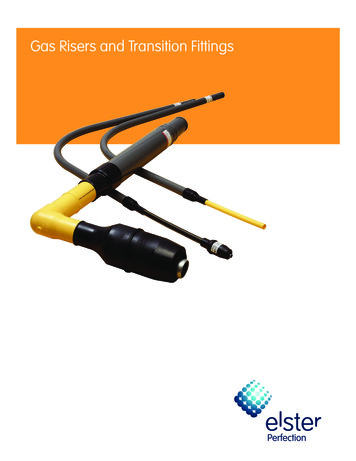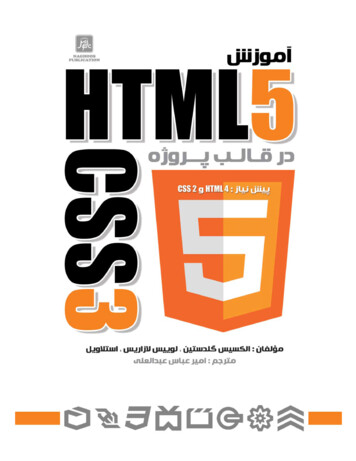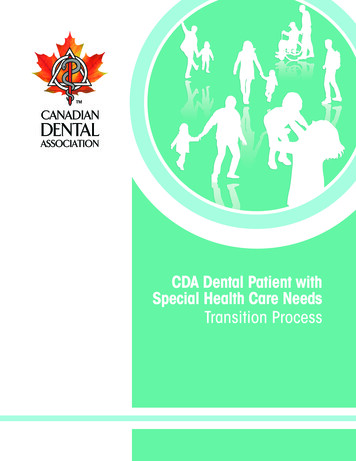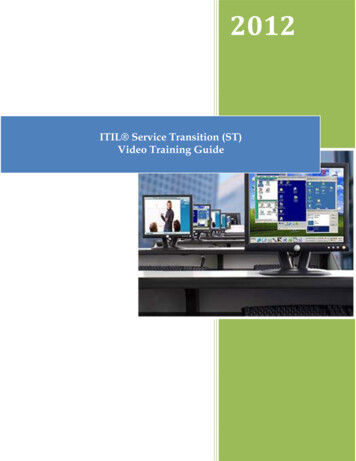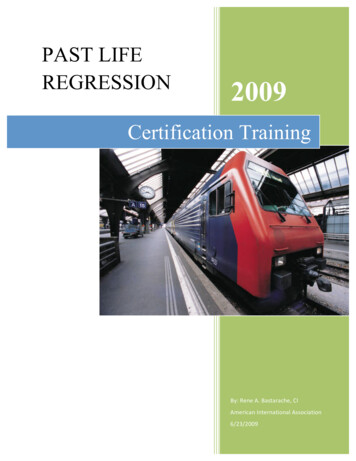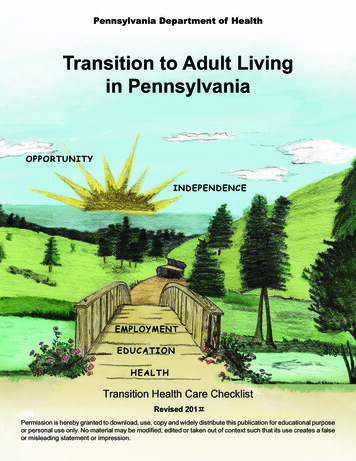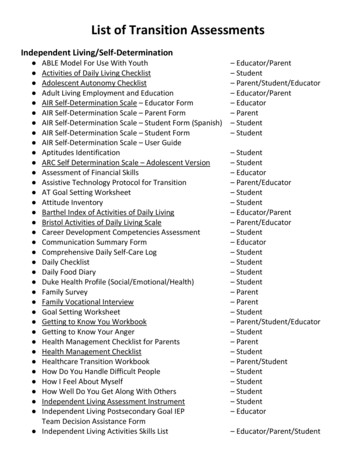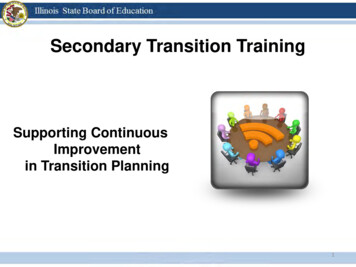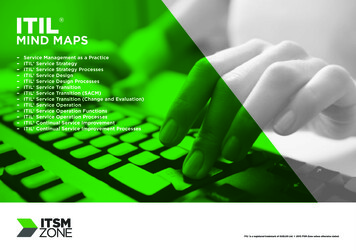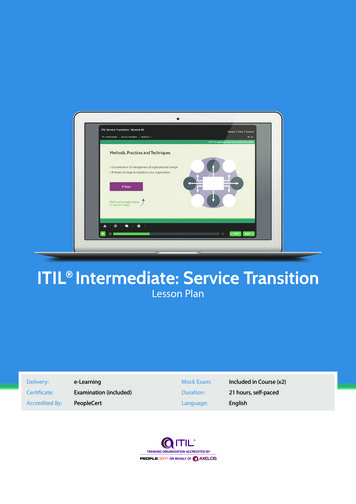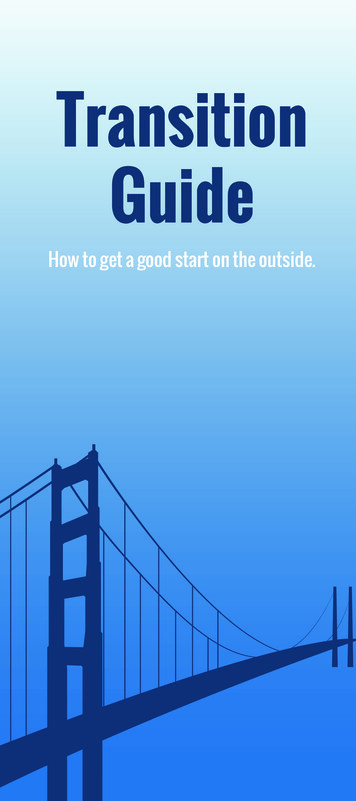
Transcription
TransitionGuideHow to get a good start on the outside.
Transition GuideHow to get a good start on the outside.The transition back to the community may be hard.This guide is for people who have just left prison andare ready to start over. It can help if you: need identification (ID) to get services. do not know where to go when you first get out. want to find food or need help to pay for food. need help finding housing. want job training or help finding a job. do not have a doctor. have chronic health problems and need health care. want to get a test for HIV, for sexually transmittedinfections (STIs), or for other diseases that can bepassed from person to person. want to get into a program to stay free from alcoholand drugs. need help with depression or other emotionalhealth problems.This guide gives you information and resources to helpyou get a good start on the outside. It tells you aboutagencies and programs that can give you support.Keep this guide with you at all times so that you canread it when you need a phone number or informationabout how to take care of your health and safety.1
Table of ContentsTAKING CARE OF YOUR IMMEDIATE NEEDS. 4Finding a Safe Place to StayFinding FoodStaying Drug FreePreventing Diseases that Can Be Spread During SexGETTING IDENTIFICATION (ID). 12Release IDNon-Driver’s ID or Driver’s LicenseSocial Security CardBirth CertificateMedicaid Benefit CardTAKING CARE OF YOUR HEALTH.18Finding a Doctor or ClinicPaying for Health CareRegular Check-upsDental HealthTips for Staying HealthyFINDING A JOB. 25Writing a ResuméThe Job InterviewGetting Help with your Job SearchWhat to Do if You Think That You Have Been.Discriminated Against in Your Job SearchAVOIDING DRUGS AND ALCOHOL. 30Tips for Staying Off Drugs and AlcoholQuitting HeroinSafe Injection PracticesOpioid Overdose PreventionSafe Disposal of Used Needles/SyringesQuitting Smoking2
PROTECTING YOURSELF & OTHERSFROM DISEASES .35HIV and AIDSOther Sexually Transmitted Infections (STIs)Hepatitis A, B & CTuberculosis (TB)LIVING WITH HIV OR AIDS . 42Finding a Doctor and Health Care ServicesGetting TreatmentHousing for People Living with HIV/AIDSLetting Partners Know They May Have Been Exposedto HIVHIV/AIDS DiscriminationCHRONIC DISEASES . 49DiabetesCoronary Heart DiseaseAsthmaEMOTIONAL WELL-BEING . 53Finding HelpFAMILY AND PARENTING. 56PregnancyDomestic ViolenceFamily ReunificationFamily Planning Benefits Program3
TAKING CARE OF YOUR IMMEDIATE NEEDSFINDING A SAFE PLACE TO STAYYou may not have a home or a place to stay whenyou first get out. Finding a safe place to stay is veryimportant. Emergency housing or shelters can give youa temporary place to stay right away and give you sometime to find more secure housing.An emergency shelter can give you a place to sleep,food, and in some shelters, use of a phone. Emergencyshelters have shared sleeping space, bathrooms,kitchens, and other areas. Some emergency sheltersare for men only, some are for families only, and someare for women who have been abused. Staff at sheltersmay be able to help you look for transitional (short-term)housing, long-term housing, get you to a case manager,or find a health care clinic. Be sure to ask shelter stafffor help.EMERGENCY SHELTERS IN NEW YORK CITYAt most emergency shelters in New York City, you canstay for 30 days, but usually for not more than 90 days.You cannot stay inside some emergency shelters duringthe day. If you are looking for emergency shelters in NewYork City, contact the Department of Homeless Services(DHS) intake center. The staff will work to meet yourneeds for short-term housing.IN THE NEW YORK CITY AREA CALL:New York City Department of Homeless Services33 Beaver Street, New York, NY 10004(212) 361-8000Single Adult Men30th Street Intake Center400-430 E. 30th Street, New York, NY 10016Single Adult WomenHELP Women’s Shelter116 Williams Avenue, Brooklyn, NY 11217718-483-7700, orFranklin Shelter1122 Franklin Avenue, Bronx, NY 10456718-842-9797New York City Housing Authority250 Broadway, New York, NY 10007(212) 306-30004
TAKING CARE OF YOUR IMMEDIATE NEEDSFortune SocietyFortune Society works with people who are in prison andtheir families, as well as helping with re-entry. FortuneSociety strives to help people make the transition backinto the community and strengthen their family ties.www.fortunesociety.orgLong Island City (Main Office)29-76 Northern Boulevard, Long Island City, NY 11101Hours: Monday - Thursday 8 AM - 8 PMFriday 8 AM - 5 PM212-691-7554Castle Gardens*625 W. 140th Street, New York, NY 10031The Fortune Academy (The Castle)*630 Riverside Drive, New York, NY 10031*No walk-ins Please call main office in Long Island CityManhattan Main Office53 West 23rd Street (between 5th and 6th Avenue)New York, NY 10010Hours: Monday - Thursday, 8 AM - 8 PMFriday 8 AM - 5 PMIntake starts at 9 AM, Monday to Wednesday.(212) 691-7554Queens Plaza, Drop-in Center29-76 Northern Blvd., Long Island City, NY 11101Hours: Monday-Friday, 8 AM - 4 PM(212) 691-7554EMERGENCY SHELTERS IN THE REST OFNEW YORK STATEMany counties in New York State do not haveemergency shelters and instead provide emergencyhousing in local motels. If you meet the program rules,many local Departments of Social Services (DSS) canhelp you pay for housing in local motels until you canfind more secure housing. These motels usually do nothave a refrigerator or a place to cook meals.5
TAKING CARE OF YOUR IMMEDIATE NEEDSFinding a place to live can take hard work andpatience. Get help from someone who knows the areaof the state where you want to live. You might be able tofind housing on your own. But there are people whosejob is to help you with housing. They are often calledhousing placement assistance workers.Having a criminal record may affect the type of publichousing you can get. You may not be accepted forhousing if you have been convicted of a violent crime,a sexual offense or arson. If you have a criminal recordand you have questions about getting housing, talk witha housing placement assistance worker.OUTSIDE THE NYC AREACall the local DSS office, which is usually listed as“Department of Social Services” in the “CountyGovernment” section of your local phone book.Most local DSS offices are not open on weekends orafter 5:00 pm on weekdays, so you have to call themduring a weekday. But if you have a case manager fromanother agency, ask him or her to help you through theDSS process because it can be confusing.For a list of county government offices, visit:www.ocfs.state.ny.us/main/localdss.aspDSS can provide a lot of help.As soon as you find a place to stay, call your ParoleOfficer. Remember, you need to call him or her within24 hours of your release date. Keep your Parole Officer’sphone number with you at all times and be sure to lethim/her know the best way to reach you.FINDING FOODIf you need food right away and you do not have themoney to pay for a hot meal, there are places (soupkitchens) that offer free hot meals or food pantriesthat will give you food to take with you. There are foodpantries or soup kitchens in many towns and cities.Call the following numbers below to find a food pantryor soup kitchen in your area. You may have to pay for thefood, or show ID (see page 12), so be sure to ask aboutthis when you call.6
TAKING CARE OF YOUR IMMEDIATE NEEDSThese are some groups you can call if you need food:Hunger Free AmericaThis agency works with the many food pantries and otherhunger groups in New York City. Their website has a list ofall food pantries in New York City:https://www.hungerfreeamerica.org/food-map50 Broad St., #1520New York, NY 10004212-825-0028, or email: hungerfreeamerica.orgHunger HotlineThis service is run by the City of New York.Call 1-866-888-8777 for free, Monday through Friday,8 AM - 5 PM to find out when and where to get food.If you live in New York City, just dial 311.NYC Human Resources Administration (HRA)HRA has many different programs and services tohelp individuals and families be independent.Call the HRA Infoline at: 1-718-557-1399 for English1-718-5571339 for c CharitiesCatholic Charities serves New York City and the wholestate. For information about services and programs or tofind a Catholic Charities near you, go to:www.catholiccharitiesusa.org. Or call the CatholicCharities free help line at 1-888-744-7900.The Salvation Army of Greater New York (City)120 W. 14th StreetNew York, NY 10011General information: 212-337-7200WHAT TO DO WHEN PAYING FOR FOODIS HARDIf you have a case manager, talk to him or her about freefood programs. If you do not have a case manager andwant to find out about how to get help paying for food,call the local Department of Social Services (DSS) office.The local office is usually listed as “Department of SocialServices” in the “County Government” section of yourlocal phone book. Most local DSS offices are not openon weekends or after 5 p.m. on weekdays, so you haveto call them during a weekday.7
TAKING CARE OF YOUR IMMEDIATE NEEDSFood StampsFood Stamps can help you pay for groceries. You may beable to get Food Stamps even if you are not on welfare.To find out where to apply for Food Stamps in yourarea, call the New York Temporary Assistance Hotline at1-800-342-3009. This is a free call.WIC (Women, Infants & Children)WIC is a food program for pregnant women and womenwith infants and young children. Call the Growing UpHealthy hotline at 1-800-522-5006 to find out more.This is a free call. TTY 1-800-655-1789.Supplemental Security Income (SSI)/DisabilitySSI is for low-income people who are 65 years or older orwho are disabled. SSI can provide you with monthly cashpayments to meet basic food, clothing, and shelter needs.To sign up for SSI, you will have to go to your local SocialSecurity Office and fill out a form.Call 1-800-772-1213, (TTY) 1-800-325-0778,to learn more about SSI.STAYING DRUG FREENow that you are out, you may need some help stayingdrug free. Using drugs can harm your health and putyou back in jail or prison. Call these numbers to get helpstaying off drugs:New York State Office of Addiction Services andSupports (OASAS). Outside of New York City, call1-877-8HOPENY (1-877-846-7369), or text 467369.Free, 24/7. Ask for the programs nearest you.New York State Office of Addiction Services andSupports. www.oasas.ny.gov/In New York City, call 1-800-NYCWELL (692-9355).This is a help line for people seeking treatment for drugs,alcohol, or emotional health problems. You can call thisnumber 24 hours a day, 7 days a week, and you do nothave to give your name.Injecting illegal drugs is not safe or good for your health.If you inject drugs, you are at risk for overdose, HIV,hepatitis B, hepatitis C, and other serious infections. Tofind methadone maintenance programs to help youquit heroin, call 1-877-8HOPENY (1-877-846-7369),Monday through Friday, 9 AM - 5 PM.8
TAKING CARE OF YOUR IMMEDIATE NEEDSIf you are going to inject, there are ways you canlower your risk for disease and protect others: Use new needles and works each time you inject. Do not share your works (syringes, needles, cotton,cookers, water, etc.). Do not buy needles on the street, even if they look new. If you are 18 or older, you can buy new syringes at some(ESAP) pharmacy. Look for this sign at drug stores:Or, ask if they sell syringes without a prescription.You may also be able to get new syringes and other harmreduction supplies at a syringe exchange program. Call1-800-541-2437 to find a drugstore that sells needles orto find a syringe exchange program. Spanish speakerscan call 1-800-233-7432. You can also use your phone orcomputer to visit: The Point, a NYS harm reduction supplyand service locater tool. www.thepointny.org.To learn more about safe injection, go to page 30.New York State’s Opioid OverdosePrevention ProgramsA life-saving law took effect on April 1, 2006, makingit legal in New York State for non-medical persons toadminister naloxone to another individual to prevent anopioid/heroin overdose from becoming fatal. Naloxone(Narcan) is an easy-to-use prescription medication thatcan reverse an opioid overdose and save a person’s lifeif it is given in time.Opioids are drugs like heroin, Oxycontin, fentanyl,codeine, morphine, and others. People are at greatestrisk of opioid overdose when beginning to use drugsafter a period of not using them.It is important to seek medical care if a person has beengiven naloxone to reverse an opioid overdose. Someopioids will last longer in the body than the naloxone andit is possible for a person to overdose a second time asthe naloxone wears off.Naloxone is not a controlled substance and is very safe touse. It can help save a life when used it is used in time toreverse an opioid overdose.9
TAKING CARE OF YOUR IMMEDIATE NEEDSNEED NALOXONE?There are multiple ways to get Naloxone/Overdose RescueKits in New York:1. Correctional Facility: If you participated in an OpioidOverdose Prevention Training during your incarcerationyou may be to get naloxone at no cost when you arereleased. Ask your counselor for more information abouthow to participate in this training and how to accessnaloxone at no cost.2. Opioid Overdose Prevention Program: The NewYork State Department of Health registers providers tooperate an Opioid Overdose Prevention Program. Theseprograms train individuals how to respond to suspectedoverdoses including the administration of naloxone. Theseprograms are sometimes available at places like healthcare facilities, health care practitioners, drug treatmentprograms, not-for-profit community-based organizationsand local health departments. These registered programsprovide training and naloxone at no cost for individualswithout prescription coverage as part of their healthinsurance plan, individuals without insurance, vulnerableindividuals or individuals using naloxone in the line of duty.3. Pharmacy: Many New York pharmacies providenaloxone through a “standing order” which means that youdon’t need a prescription to get the medication.If you have insurance, you can use your prescriptioncoverage to help pay for naloxone at the pharmacy. If youhave a prescription coverage as part of your insuranceplan, you can use the Naloxone Co-payment AssistanceProgram (N-CAP) to cover up to 40 to reduce or eliminateyour out-of-pocket expenses when getting naloxone at aparticipating pharmacy. Ask the pharmacist if their storeparticipates in N-CAP.A directory of registered Opioid Overdose PreventionPrograms as well as the list of pharmacies in each regionwith a standing order are available at this website: https://www.health.ny.gov/overdoseFor more information you can call the New York StateDepartment of Health AIDS Institute at 1-800-692-8528.English/SpanishFor ESAP ordering or Syringe Exchange Programs press #1For Opioid Overdose Prevention press #2For the Office of Drug User Health, naloxone or N-CAP press #3For buprenorphine or bup trainings press #4For ESAP programs, pharmacies or syringe disposal sitespress #510
TAKING CARE OF YOUR IMMEDIATE NEEDSPREVENTING DISEASESTHAT CAN BE SPREAD DURING SEXThere are many diseases that can be passed throughsexual contact. These are called sexually transmittedinfections (STIs). STIs are spread from person to personby vaginal, anal, or oral sex. Some STIs are also spreadby skin-to-skin contact. You cannot tell by looking atsomeone if he or she has an STI. You may not even knowif you have an STI. Even if you have no signs or symptoms,you can still spread an STI to others (even skin that looksnormal may be infected). HIV, the virus that causes AIDS, isjust one type of STI. Most people who have HIV or anotherSTI have no signs or symptoms. The only way to know forsure if you have an STI is to get tested. See page 36 tolearn more.If you are having sex, you can lower your chances ofgetting an STI by using a latex male condom or a femalecondom each time you have sex. Latex male condoms andfemale condoms work very well to prevent the spread ofHIV and many other STIs.HOW ELSE CAN YOU LOWER YOUR CHANCEOF GETTING OR PASSING AN STI?Make sure you do not get anyone else’s blood, semen, vaginalfluids, or breast milk in your body. Protect your partners, too.Condoms are the best protection and the only way to protectyourself and your partner from STIs or HIV. It is important touse condoms correctly every time you have sex.Drug use can also lead people to take risks that they mightnot take if they weren’t high. These drugs include alcohol,cocaine, crack, heroin, and marijuana.Be honest with yourself about the risks you take anddecide how you can be safer.To protect yourself and your partner: Always use condoms. Do not have sex if you have sores or other signs ofinfection. Get tested and treated by a doctor or a clinic.Pre-exposure prophylaxis, or PrEP, is a prevention optionfor people who are at high risk of getting HIV. It’s meant tobe used consistently, as a pill taken every day, and to beused with other prevention options such as condoms. Findout if PrEP is right for you. Visit: www.cdc.gov/hiv/basics/prep.htmlFor a list of New York State PrEP Providers:1-800-541-AIDS or uteny.org/11
GETTING IDENTIFICATION (ID)You may find that you need an ID (proof of who you are)for many services, including housing or health care, and toapply for a job.This section will give you information on how to get eachof these important forms of ID. You will need to fill outmany forms and show other forms of ID. You must useyour real name (the one on your birth certificate) when youapply. You cannot use nicknames or aliases.RELEASE IDA release ID is given to people leaving prison so that theycan show proof of who they are. If you have been givena release ID, it is good for 60 days (about two months)after the date of your release. You can use it to get a NonDriver’s ID or a Driver’s License.NON-DRIVER’S ID OR DRIVER’S LICENSEA Non-Driver’s ID does not allow you to drive, but it is agood form of picture ID that will help you get into housingprograms, apply for jobs, or get medical care. You canget these IDs at the state Department of Motor Vehicles(DMV). You will need to show another form of ID to get aNon-Driver’s ID or a Driver’s License; for example, a birthcertificate. Call the DMV before you go so that you knowwhat forms of ID you will need to bring.To find a DMV near you, call:New York State Department of Motor Vehicles1-518-486-9786New York City Department of Motor Vehicles1-718-966-6155General Telephone Assistance (DMV Call Centers):DMV Call Center Representatives are available weekdays(except state holidays) between 8AM and 4PM (Eastern Time).From area codes 212, 347, 646, 718, 917 & 929:1-212-645-5550 or 1-718-966-6155From area codes 516, 631, 845 and 914:1-718-477-4820From area codes 315, 518, 585, 607 and 716:1-518-486-9786Telecommunications Device for the Deaf (TDD)1-800-622-1220From outside New York State:1-518-473-559512
GETTING IDENTIFICATION (ID)SOCIAL SECURITY CARDThe Social Security card lists your nine-digit SocialSecurity number (SSN). This number is unique to you andcannot be used by anyone else. All United States citizensborn in this country get a SSN at birth. If you do not haveyour original card and need a new one, you can get oneat a Social Security Administration Office. You will needto fill out a form called an SS-5. You will also need toshow two forms of ID that prove your age, identity, andU.S. citizenship or visa. Only the original forms of ID areaccepted, no photocopies. IDs that the Social Securityoffice accepts are: Driver’s license or Insurance policynon-driver’s ID Health insurance Marriage or divorce record School ID Military record Adoption record Employer ID card PassportTo find a social security office near you, call:1-800-772-1213.The TTY number for deaf and hard-of-hearing people is:1-800-325-0778.When you call these numbers, you will get a recordedmessage.Wait for a message that says, “To speak to a socialsecurity representative, press 0.” You may have to waiton the line for several minutes; be patient and hold on theline so that you can get the information you needto get your Social Security card.13
GETTING IDENTIFICATION (ID)BIRTH CERTIFICATEYou may need your birth certificate as proof of yourage and identity to apply for other forms of ID or healthinsurance. You can request a copy of your official birthcertificate by writing to the department of health in thestate where you were born. You may have to pay toget this new birth certificate and you will need to sendcopies of proof of your identity. Call the department ofhealth before you send your letter and ask how much itwill cost for a new birth certificate, what type of paymentthey will accept (for example, personal checks or moneyorders) and what type of ID they will need for your proof ofidentity. Be prepared to tell them your: Full name (not a nickname or alias). Exact date of birth (month/day/year). Mother’s maiden name (her last name before she wasmarried). F ather’s full name (you do not have to include yourfather’s name – this is your choice). B irth place – either the name of the hospital or thestreet address where you were born.14
GETTING IDENTIFICATION (ID)To request a birth certificate from the department ofhealth, call or write to this address if you were born in oneof the five boroughs of New York City:New York City Department of HealthOffice of Vital RecordsDial 311 or shtmlIf you were born in New York State (outside the fiveboroughs of New York City):New York State Department of HealthOffice of Vital Records1- 855-322-1022www.health.ny.gov/vital records/800 North Pearl Street, 2nd Floor,Menands, NY 122041-877-854-4481(Free within NYS)On the next page is a sample letter to the departmentof health asking for a birth certificate.15
GETTING IDENTIFICATION (ID)SAMPLE LETTER ASKING THE DEPARTMENTOF HEALTH FOR A BIRTH CERTIFICATENameStreet Address or P.O. BoxCity, State, Zip CodeNew York State Department of HealthOffice of Vital Records800 North Pearl Street2nd FloorAlbany, NY 122041-877-854-4481To Whom It May Concern:Please accept this letter as my request for a copyof my birth certificate. My full name is (your fullname here). I was born in (name of hospital orstreet address where you were born) on (month/date/year). My mother’s maiden name is (mother’smaiden name). My father’s name is (father’s namehere. You do not have to include your father’sname; this is your choice.) Enclosed is a copy of my(type of ID, proof of identity) and a money orderin the amount of (total cost here). Please send mybirth certificate to this address:NameStreet Address or P.O. BoxCity, State, Zip CodeIf you have any questions, please call me at (phonenumber). Thank you for your help.Please note: Remember to sign the letter.16
GETTING IDENTIFICATION (ID)MEDICAID BENEFIT CARDMedicaid is a program for people who cannot afford to payfor medical care. Many people leaving prison qualify forMedicaid. You may be covered by Medicaid if: you have high medical bills. you receive Supplemental Security Income (SSI). you meet certain income, resource, age, or disabilityrequirements.You may apply for Medicaid in the following ways: NY State of Health, The Official Health Plan Marketplace1-855-355-5777 Online website https://nystateofhealth.ny.gov/ Managed Care Organization SiteSchedule Navigators and CertifiedApplication Counselors Medicaid Helpline 1-800-541-2831 Local district Social Services Offices (see page 46)or visit www.health.ny.gov/health care/medicaid/ldss.htmWhere you apply for Medicaid will depend on yourcategory. Your category might be single, childless couples,pregnant women, parent(s) and caretaker relatives withdependent children, elderly and/or disabled.The Marketplace determines eligibility using ModifiedAdjusted Gross Income (MAGI) Rules. In general, incomeis counted with the same rules as the Internal RevenueService (IRS) with minor variations. Applications may becompleted online, in person with a navigator or certifiedapplication counselor, by mail and by phone.17
TAKING CARE OF YOUR HEALTHFINDING A DOCTOR OR CLINICFinding a doctor or clinic that gives you the care you wantand need is important. There are many things to thinkabout when you are looking for a doctor or clinic. Some ofthe questions you may want to ask are: Do you have any special health concerns and does thatdoctor have experience treating them? Is the doctor or clinic easy for you to get to? Is the office open during hours that fit your schedule? Do they accept “walk-in” visits? Do they accept your health insurance?What other methods of payment do they accept?If you need help finding a doctor, ask your parole officer orcase manager. Or, talk to trusted family members, friends,and coworkers who are familiar with doctors and clinicsthat meet your needs. Call your county department ofhealth and find out about health care clinics they may offer,such as family planning, pregnancy care, screening fordiseases that can be passed from person to person, HIVtesting, or dental care. The county department of healthis usually listed as “Department of Health” in the “CountyGovernment” section of your local phone book.Or in NYC, call 311.PAYING FOR HEALTH CAREThere are many ways to pay for health care. Some arelisted below.Medicaid and Medicare are government programs thatpay for health care services for people who qualify.Medicaid covers: Hospital in-patient care Hospital out-patient care,like emergency room orclinic visits Doctor visits Eyeglasses Hearing aids Medicines Dental care Other servicesYou can get Medicaid if you: Receive public assistance Are on Supplemental Security Income (SSI) Get assistance through the HIV/AIDS ServicesAdministration (HASA) in New York City18
TAKING CARE OF YOUR HEALTH Meet other income, resource, age, or disabilityrequirements Persons with AIDS (PWA’s) can get services either ifthey have AIDS or have symptoms of HIVGetting MedicaidTo get information on getting Medicaid in New York City,call the Human Resources Administration at 718-557-1399for English, 718-557-1339 for Spanish, or go to www.cms.hhs.gov/medicaid/ for more information. Outside ofNew York City, call the New York State Medicaid Hotline at1-800-541-2831.MedicareMedicare is a federal program that helps people aged65 years or older and some people with disabilities paytheir medical bills. Medicare can cover the cost of hospitalstays, follow-up care, doctor’s fees, and medical supplies.Call the Human Resources Administration at1-877-472-8411 or 1-800-633-4227 for more information.NY State of HealthNY State of Health is an organized marketplace designedto help people shop for and enroll in health insurancecoverage. Individuals, families and small businesses canuse the Marketplace to help them compare insuranceoptions, calculate costs and select coverage by going to:https://nystateofhealth.ny.gov/ online, nystateofhealth.ny.gov/agent/hx brokerSearch, ervice-centeropen: over the phone, or by mail. The Marketplace helpspeople to check their eligibility for health care programslike Medicaid, and to sign up for these programs if they areeligible.The Marketplace also tells what type of financial assistanceis available to applicants to help them afford healthinsurance purchased through the Marketplace.Visit: https://nystateofhealth.ny.gov/Help Line: 1-855-355-5777TTY: 1-800-662-1220Hours: Monday - Friday, 8 AM - 8 PMSaturday, 9 AM - 1 PM19
TAKING CARE OF YOUR HEALTHYou may also be able to get private insurance through youremployer and pay for it yourself.Ask your employer about their health insurance coverage.Call your local or county department of health to find outabout free clinics they may offer. Some local healthdepartments offer family planning, pregnancy care, screening for diseases that can be passed from personto person, HIV testing, or dental care.Community agencies or hospitals may also offer free orlow-cost health care clinics. To find these, look in the“health care” section of your local phone book.GETTING REGULAR CHECK-UPSWhether or not you have health problems, it is a goodidea to get a full health check-up by a doctor or healthcare provider. Yearly visits let you and your doctor screenfor diseases that can affect your health. When you havea check-up, ask questions, and make sure you know yourhealth problems and how to take care of them. When youfirst visit the doctor, be sure to give your whole healthhistory, including how you feel on the day of the visit, a fulllist of medicines or drugs you are taking, and any healthconcerns you now have.List all the drugs prescribed to you by otherdoctors, any drugs you buy over-the-counter without aprescription, herbal or alternative drugs, and illicit or illegaldrugs. Do not assume that your doctor or health careprovider will test you for everything; be sure to ask fortests that you are interested in.REGULAR EXAMS AND TESTS FOR MENThese are some of the things your doctor may recommend: measure your height and weight blood pressure blood cholesterol test colorectal cancer screening prostate cancer screening test testicular examination tests for sexually transmitted infections20
TAKING CARE OF YOUR HEALTHREGULAR EXAMS AND TESTS FOR WOMENThese are some of the tests your doctor or you may ask for: measure your height and weight blood pressure blood cholesterol test breast exa
Food Stamps Food Stamps can help you pay for groceries. You may be able to get Food Stamps even if you are not on welfare. To find out where to apply for Food Stamps in your area, call the New York Temporary Assistance Hotline at 1-800-342-3009. This is a free call. WIC (Women, Infants & Children) WIC is a food program for pregnant women and women
